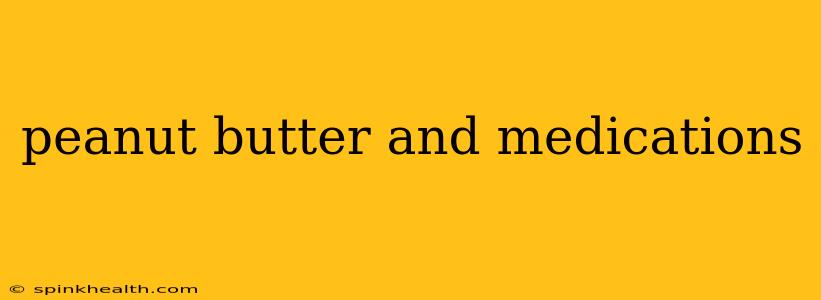Let's be honest, peanut butter is delicious. That creamy, nutty goodness is a staple in many pantries, a beloved addition to sandwiches, snacks, and even baking. But what happens when you mix that beloved spread with your medication? Can peanut butter and medications mix? It's a question that deserves a closer look, and it's one that involves more than just a simple yes or no.
This isn't just about avoiding a messy kitchen counter; it's about understanding how certain foods can interact with medications, potentially affecting their absorption and efficacy. This article will delve into the intricacies of this relationship, exploring the potential interactions and providing you with the knowledge to make informed choices about your health.
Can Peanut Butter Affect the Absorption of My Medication?
This is a key question, and the answer is: it depends. Peanut butter itself doesn't directly interact with most medications in a harmful way. However, its fat content plays a crucial role. Some medications are better absorbed when taken with food, and the fats in peanut butter can enhance the absorption of certain medications. This is especially true for medications that are better absorbed when taken with a fattier meal. However, this can be both a boon and a bane. While the absorption might increase, it also means that the medication's effects may be felt more strongly or for a longer period.
On the other hand, certain medications shouldn't be taken with high-fat foods. The fat content can interfere with their absorption or even increase the risk of side effects. This highlights the importance of consulting your physician or pharmacist regarding any concerns.
What Medications Should I Avoid Taking With Peanut Butter?
There isn't a definitive list of medications that are strictly "forbidden" to be taken with peanut butter. The potential for interaction is highly medication-specific. Instead of focusing on specific medications to avoid, it's crucial to understand the underlying principle: always consult your pharmacist or doctor. They can assess your specific medication and provide tailored advice.
Some medications, particularly those that are sensitive to changes in fat absorption, are more likely to be affected. Don’t assume it’s okay; always check with a healthcare professional.
Does the Type of Peanut Butter Matter?
While most peanut butter variations share a similar fat profile, slight differences might exist. For example, natural peanut butter, which typically has only peanuts and salt as ingredients, may slightly differ from those containing added sugar, oil, or other additives. However, the fat content remains the primary factor influencing medication absorption. This subtle difference is usually not significant enough to alter the interaction with medication, but again, it’s best to discuss any specific concerns with your doctor or pharmacist.
Can Peanut Butter Affect Medication Timing?
The timing of medication intake, especially relative to food, matters. Some medications are best taken on an empty stomach for optimal absorption. Taking them with peanut butter, or any high-fat food, could delay or reduce absorption. Conversely, other medications benefit from being taken with food to lessen potential stomach upset. Your physician or pharmacist should provide guidance on the best time to take your medications, in relation to food.
What If I Accidentally Took My Medication With Peanut Butter?
If you accidentally consumed your medication with peanut butter, don't panic. In most cases, the consequences will be minimal. However, if you experience any unusual or concerning symptoms, such as nausea, vomiting, or dizziness, contact your doctor or pharmacist immediately. This is especially important if you are taking medications with a narrow therapeutic index (meaning small changes in dosage can have significant effects).
Should I be Concerned About Allergic Reactions?
Beyond medication interactions, always consider the potential for allergic reactions. Peanut allergies are prevalent, and severe reactions can occur. If you or someone in your household has a peanut allergy, carefully manage the storage and consumption of peanut butter to avoid accidental exposure.
In conclusion, the relationship between peanut butter and medications is not straightforward. While peanut butter itself is generally harmless, its fat content can influence the absorption of certain medications. The key is proactive communication with your healthcare team. Always consult your doctor or pharmacist before making any dietary changes, particularly those that might influence the efficacy of your medications. Their expertise will ensure your safety and the optimal effectiveness of your treatment plan. Don't let a delicious spread overshadow the importance of informed healthcare decisions.

